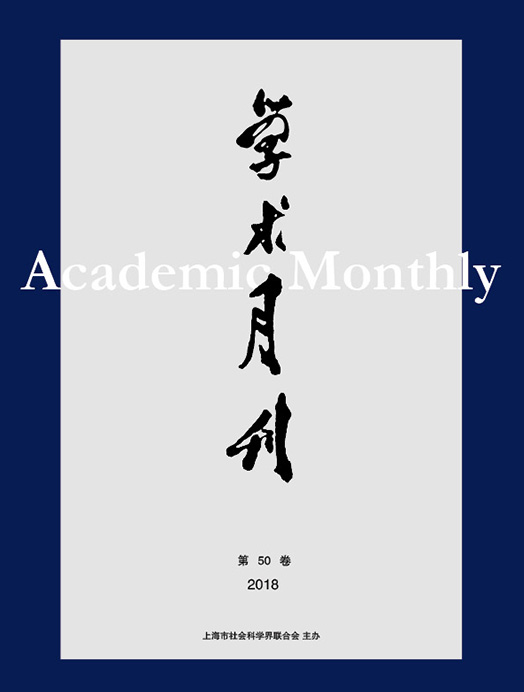Citation:
Guofang ZHANG. The Typological Meaning of the Classification of “Community/Society” from Fernand Tonnes[J]. Academic Monthly, 2019, 51(2): 78-85.

The Typological Meaning of the Classification of “Community/Society” from Fernand Tonnes
-
Abstract
How is the common, mutually affirmative community life possible? In the book of Community and Society - the Basic Concepts of Pure Sociology, Tonnes answered this question. There are two ways to live together: one is " community life” based on emotional orientation, which is organic, lasting, and natural; one is based on interest (with purpose, tool) orientation. The " social life”, this way of life is artificial, temporary and mechanical, from which a basic concept of community/society is integrated. From the type of theory or concept (pure sociology), Tonnes recognizes and understands the factual life of the human community (applied sociology), and lays down the basic problem consciousness and " standard type” in the field of sociology. This group of concepts seems to be opposition, but they are in fact dialectical unity existing in the life of human communities. This classification study is based on the perspective of holism and historicalism, based on the philosophy of Hobbes and Kant, and analyzes the actual state of human community life through the theories of psychology, intellectual history, law, political economy and other disciplines. It provides a reference for the study of typical types of contemporary Chinese village communities. From the perspective of social philosophy, how can the village community be made possible and in what form? Taking Tonnes’s typological research theory as the starting point, analyzes the typical types of contemporary Chinese village communities from the perspectives of politics, economy and culture and explains the significance of the existence of village communities, perhaps can provide reference for the research on the transition mechanism and typical types of contemporary Chinese village communities.
-

-
References
-
Access
-
-
[1]
Shangjian YAO
. Right and Communities: National Borders of Ethnic Diversity. Academic Monthly,
2019, 51(11): 70-78.
-
[2]
Xiaohong ZHOU
. Collective Memory: Community of Fate and Social Construction of Individual Narrative. Academic Monthly,
2022, 54(3): 151-161.
-
[3]
Sheng LI
. Legal Rhetoric in Social-Historical Context: Macro Function under the View of Community Construction. Academic Monthly,
2021, 53(9): 113-128.
-
[4]
Guangjun ZHOU
. Ethnic Rights in the Evolution of the Nation State Community: Boundaries and Governance. Academic Monthly,
2020, 52(9): 84-94.
-
[5]
XIONG Yuezhi
. . Academic Monthly,
2018, 50(6): 133-145.
-
[6]
ZHOU Pan
. From Identity to Contract: Community Dilemma in the Reform of Collective Property Rights System. Academic Monthly,
2023, 55(11): 123-135.
-
[7]
LIU Jianjun
. . Academic Monthly,
2018, 50(9): 81-91.
-
[8]
Weizhuo ZHANG
. The Ethical Implication of Community: Ferdinand Tönnies’ Synthesis of Hegel’s and Marx’s View of the Relationship between State and Society. Academic Monthly,
2021, 53(5): 134-145.
-
[9]
. . Academic Monthly,
2016, 48(12): 5-13.
-
[10]
ZHANG Xiang
. . Academic Monthly,
2018, 50(6): 67-77.
-
[11]
Xing NAN
. Do Artificial Agents Have Free Will?. Academic Monthly,
2021, 53(1): 35-47.
-
[12]
Yidong WEI
, Shengguo WU
. The Solution of “the Problem of Free Will” in Theory of Contextual Identity. Academic Monthly,
2018, 50(11): 18-27.
-
[13]
Ruiquan GAO
. The Obscure and the Conspicuous: The Concept of Free Will in the Course of Development of Monism of Mind. Academic Monthly,
2022, 54(11): 5-16.
-
[14]
SUN Wanhuai
. Is Free Will the Rational Basis of Responsibilitism. Academic Monthly,
2023, 55(8): 106-122.
-
[15]
,
. . Academic Monthly,
2018, 50(01): 63-77.
-
[16]
Wenjing ZHONG
, Biliang LUO
. The Asset Logic of Farmers Moving towards Common Prosperity. Academic Monthly,
2022, 54(11): 38-53.
-
[17]
LIU Shouying
. Open Access Order and the Common Prosperity for Rural People. Academic Monthly,
2023, 55(8): 41-60.
-
[18]
Shao’an HUANG
. Complete Historical Materialism and the Choice and Reform of Socialist Economic System. Academic Monthly,
2022, 54(2): 36-47.
-
[19]
. . Academic Monthly,
2017, 49(08): 18-29.
-
[20]
Zhouwang CHEN
. All-dimensions Democracy: The Theories and Institutional Choice of the Socialist Democracy with Chinese Characteristics. Academic Monthly,
2020, 52(2): 68-75.
-
-



 沪公网安备 31010102003103号
沪公网安备 31010102003103号 DownLoad:
DownLoad: